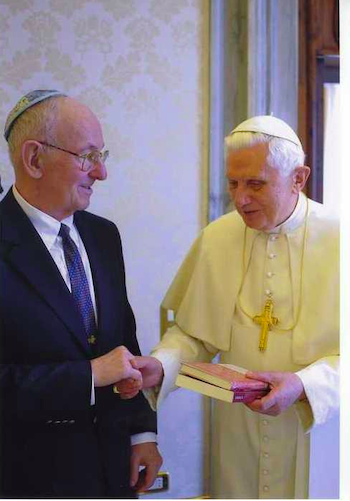In 2000, prolific scholar of rabbinic Judaism Jacob Neusner published A Rabbi Talks with Jesus (Montreal: McGill-Queen's University) in which he contrasted Jesus' message of the kingdom with the Jewish Torah's concept of Israel's relationship with God. Pope Benedict XVI found this imagined debate so intriguing that he felt compelled to address it in his 2007 book, Jesus of Nazareth (New York: Doubleday), in which he spent a chapter crafting a Christian response to some of the points Neusner raised. This thoughtful exchange constitutes one of the few times in Christianity's two-millennia history that a sitting pope has had a written, respectful exchange with a Jewish scholar, especially on the topic of Jesus. Afterwards, through a series of written exchanges, the respect between the two men and scholars grew, and Benedict invited Neusner for a private audience during the weekend on which the Pope visited a Roman synagogue, January 17, 2010. In this essay, Neusner recounts his short visit with Pope Benedict.
By Jacob Neusner
Research Professor of Theology and Religion
Bard College
February 2010
A visit to the Pope in his office in the Vatican that was accorded to me wife and me on January 18th, the day after the Pope visited the synagogue in Rome in January brings about an awesome visual experience in an elegant museum. The walk in the papal apartments leads through five long rooms, richly decorated in antiques and hangings and paved with marble. The windows in the room adjacent to the Pope’s office overlook St. Peter’s square and from the window right outside to the Pope’s office you look out and see what the Pope sees when he blesses the city and the world.
If you think our walk to the heart of Catholic Christianity precipitated long, long thoughts of history and family — what would the first Jacob Neusner, my grandfather from Koretz in Volhynia Gubernya and Beverly, Massachusetts, who died seventy-seven years ago, a few months before I was born, have thought today, how many Jewish scholars had had occasion to walk through those palatial rooms and what brought them to call on the Pope, and as guard after guard saluted my wife and me how often kippah-wearing visitors received the Swiss guards’ salute — if you thought it was these thoughts of who and where I was, you’re mistaken. Midway through the walk from room to room, I had the awful thought that my fly was open. I checked. It was — but not for long.

Waiting outside the Pope’s office, we wondered what he would want to discuss. We need not have worried. Cardinal Joseph Ratzinger and I have in common and talked about what professors always discuss: what are you working on, and what will you do next? how are you feeling, what do you think of the students these days? So when my wife and I spent our twenty five minutes by ourselves with Benedict XVI, I asked him how he was progressing with volume two of Jesus of Nazareth, and he asked me whether I’m still publishing a book a month. I asked him what he was planning for his next book. In reply to questions on the student generation, I told him I adore the students at Bard College, the best I’ve known in fifty years of teaching, and in reply to my question on his scholarly progress, he told me that volume II of his Jesus of Nazareth would come out in about six months and that would be the last book he would write. But, he explained to me, he has other work to do that will keep him busy. It would have been disingenuous to ask what this work was, and I dropped the subject — with regret. But that’s the price exacted from a major scholar who is elected Pope, bishop of Rome, the deputy of Peter.
And that was before we even sat down. The news that he was writing his last book struck me as sad. I said so and he reminded me that he is older than I — as it happens, it is by five years. That his book writing days are coming to an end closed off discussion of the book I had hoped to write with him — dialogue on the apostle Paul’s theology of Israel in Romans —and I didn’t bring it up. He asked me what I’m working on, I started, “Form analysis of the Rabbinic canon…” Seeing his eyes glaze over in response, I broke off and took the occasion to give him the copy of my new book introducing the Talmud (The Talmud: What is it? what does it say?), published just now in Italian, and the German translation of my Rabbi Talks with Jesus. He appreciated the book in his native German and thanked me that the Talmud book was not too long to read in the time he had for reading. Teaching, scholarship, publication — the things professors do and discuss with good humor — marked the boundaries of professors’ chitchat.
He told my wife that reading my Rabbi Talks with Jesus gave him comfort when his sister died. I left with a vivid picture of a humble and good natured man wholly devoted to the service of God. With his bright blue eyes he looks you square in the eye and looks back when you respond. He is generous in his appreciation of others and does not take for granted the appreciation of others. I leave it to others to speak for the Jewish People in the coming negotiations that will engage us over issues of common concern between Judaism and Catholic Christianity. I cherish the memory of the man I met in Rome
